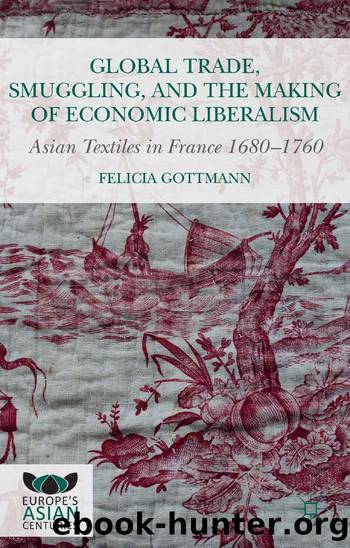Global Trade, Smuggling, and the Making of Economic Liberalism: Asian Textiles in France 1680â1760 by Felicia Gottmann

Author:Felicia Gottmann [Gottmann, Felicia]
Language: eng
Format: epub
Publisher: Guidelines
The anciennes manufactures: Arguments and Strategy
The importance and support that Colbert had accorded to manufactures in general, and to textile manufactures in particular, remained a cornerstone of French economic policy, and the established manufacturing centres, especially Lyonâs Grande Fabrique de Soie, its famous silk manufacturing guild, but equally Tours, Paris, and later also Rouen as a centre for cotton production, retained this prestige throughout our period.6 And, throughout our period, the manufacturing guilds exploited that position to fight against Asian and Asian-style textiles. They did not leave it at the original prohibition of 1686: given the scale and pervasiveness of smuggling and consumption as well as the regular exceptions and exemptions granted to Marseilles and the French East India Companies, they kept up the pressure and by the 1750s they had built up quite a tradition of protest. This involved certain stock-in-trade arguments which would persist throughout the fierce public debate in the 1750s as would the institutions behind them, who collaborated closely in their campaigns: Lyon, Tours, and Paris, with the later and very important addition of Rouen, who were regularly supported by Nîmes, Reims, Troyes, and Amiens.7
The merchant-manufacturers had a long tradition of expressing their concerns in a variety of means: in printed memoranda, in letters to the authorities, mainly to the Controller General, and also via their deputies of commerce who voiced complaints to the Council and Bureau of Commerce on a regular basis, supporting and echoing the arguments made by the guilds.8 The particular focus here will be on printed pamphlets, which became of crucial importance when the calico debate burst onto the public sphere in the 1750s. Both in terms of argument, rhetoric, and strategy, as well as in authorship, these tracts show a remarkable consistency over the decades. It is hence possible to give a systematic rather than chronological analysis of a sample of these interventions. The sample chosen here is comprehensive, covering the period 1701 to 1759 and comprising 23 printed tracts, which range in length from between 3 to 11 pages.9 The pamphlets share a conservative outlook in which paternalist moral arguments are seamlessly blended with a protectionist and mercantilist rationale to demand that the royal administration reverse recent developments harmful to their industry.
Download
This site does not store any files on its server. We only index and link to content provided by other sites. Please contact the content providers to delete copyright contents if any and email us, we'll remove relevant links or contents immediately.
International Integration of the Brazilian Economy by Elias C. Grivoyannis(111033)
The Radium Girls by Kate Moore(12019)
Turbulence by E. J. Noyes(8040)
Nudge - Improving Decisions about Health, Wealth, and Happiness by Thaler Sunstein(7694)
The Black Swan by Nassim Nicholas Taleb(7113)
Rich Dad Poor Dad by Robert T. Kiyosaki(6613)
Pioneering Portfolio Management by David F. Swensen(6291)
Man-made Catastrophes and Risk Information Concealment by Dmitry Chernov & Didier Sornette(6010)
Zero to One by Peter Thiel(5789)
Secrecy World by Jake Bernstein(4743)
Millionaire: The Philanderer, Gambler, and Duelist Who Invented Modern Finance by Janet Gleeson(4471)
The Age of Surveillance Capitalism by Shoshana Zuboff(4281)
Skin in the Game by Nassim Nicholas Taleb(4241)
The Money Culture by Michael Lewis(4198)
Bullshit Jobs by David Graeber(4180)
Skin in the Game: Hidden Asymmetries in Daily Life by Nassim Nicholas Taleb(3993)
The Dhandho Investor by Mohnish Pabrai(3760)
The Wisdom of Finance by Mihir Desai(3736)
Blockchain Basics by Daniel Drescher(3574)
